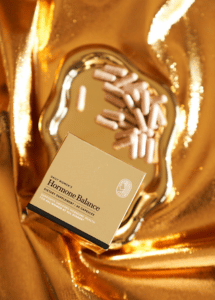EQ Hormone Primer

 Our hormones are so important in the regulation of many aspects of well-being, from mood, sleep, menstrual cycles, and more – they also contribute to bone health, brain health, heart health, and other critical areas that become increasingly important if we have a goal of healthy aging. This Hormone Primer will get you a little more familiar with your hormones and introduce you to some things you can do in order to support your own hormonal balance!
Our hormones are so important in the regulation of many aspects of well-being, from mood, sleep, menstrual cycles, and more – they also contribute to bone health, brain health, heart health, and other critical areas that become increasingly important if we have a goal of healthy aging. This Hormone Primer will get you a little more familiar with your hormones and introduce you to some things you can do in order to support your own hormonal balance!
Step 1: Assess your current hormone balance with our Hormone Quiz
How balanced are your hormones? In the midst of demanding routines and constant stimuli, the delicate balance of hormones can sometimes be overlooked. Are mood swings, quality of sleep, or stress casting shadows on your well-being? Take a deeper look into your hormones with this quiz, and then let EQ guide you on a journey towards greater balance.
Step 2: Get to know the key players
Our hormones are chemical messengers that play a pivotal role in orchestrating the symphony of our body’s functions. From regulating mood and metabolism to influencing growth and development, hormones are the conductors of our physiological orchestra. Here are some of the key hormones found in the human body:

- Estrogen: Estrogen is a group of hormones that are instrumental in the development and maintenance of female reproductive tissues and the regulation of the menstrual cycle.
- Progesterone: Progesterone is a hormone that plays a crucial role in the female reproductive system. It is one of the main hormones involved in regulating the menstrual cycle and supporting pregnancy.
- DHEA: DHEA, or dehydroepiandrosterone, is a hormone produced by the adrenal glands which are located on top of each kidney. It serves as a precursor to both male and female sex hormones, including testosterone. DHEA is considered a pro-hormone because the body can convert it into other hormones.
- Testosterone: Testosterone is a hormone that aids in the development and maintenance of male reproductive tissues and the regulation of various physiological processes in both males and females.
Step 3: Is It Time To Test Your Hormones?
Embarking on the journey of getting your hormones tested offers a window into the intricate symphony playing within your body’s ecosystem, and there are some signs that you can look for as you begin to think about your hormones, and heed the subtle whispers your body may be sharing. Are there mood swings resembling a dramatic rollercoaster ride, or perhaps unexplained bouts of fatigue making surprise appearances? These nuanced signals are your body’s way of beckoning you toward a deeper exploration of its hormonal landscape. A great way to be in better tune with your body is using a cycle tracker app like Flo, which gets you familiar with tracking what is happening with your body at different times of the month.
 Signs of hormonal imbalance
Signs of hormonal imbalance
Mood Swings: Unexplained and frequent changes in mood, from euphoria to irritability, may indicate hormonal imbalances.
Fatigue: Persistent and unexplained fatigue, even after a good night’s sleep, could be a signal for hormonal assessment.
Sleep Patterns: If you find your sleep patterns disrupted, whether it’s difficulty falling asleep or waking up frequently, it may be time to explore your hormonal balance.
Sweet tooth: Sudden and intense sugar cravings might be your body’s way of signaling hormonal fluctuations. Check out this site for some healthier sweet treat recipes.
Listening to your body’s signals
These signals are not mere noise, but rather a unique language your body speaks, urging you to listen and understand. The orchestra of hormones orchestrating your daily life is intricate and multifaceted, and your journey into hormone testing is like learning to decipher this language and gaining insights into the subtle cues that influence your overall health.
Step 4: Eating For Hormonal Health
In the hustle and bustle of daily life, it’s easy to overlook the profound impact our dietary choices can have on our hormonal health. While hormonal fluctuations are a natural part of life, the foods we consume play a crucial role in supporting and balancing these essential chemical messengers. Let’s embark on a culinary journey exploring how certain foods can become your allies in promoting hormonal harmony.
Omega-3 Fatty Acids: The Brain’s Best Friend
 Starting our journey with a splash of omega-3 fatty acids, found abundantly in fatty fish like salmon, chia seeds, and walnuts. These essential fats are not just heart-healthy; they also support brain function and help regulate hormones.
Starting our journey with a splash of omega-3 fatty acids, found abundantly in fatty fish like salmon, chia seeds, and walnuts. These essential fats are not just heart-healthy; they also support brain function and help regulate hormones.
Leafy Greens: The Micronutrient Marvels
Dark, leafy greens such as kale, spinach, and Swiss chard are a powerhouse of vitamins and minerals, including magnesium. Magnesium plays a vital role in numerous biochemical reactions in the body, influencing hormone regulation.
Fermented Foods: Gut Health, Hormone Health
Delving into the world of fermented foods like yogurt, sauerkraut, and kimchi reveals a secret to hormonal well-being: a healthy gut. The gut microbiome plays a crucial role in hormone metabolism, and fermented foods contribute to a flourishing gut environment.
Lean Proteins: Building Blocks for Hormonal Harmony
Proteins are the building blocks of life, and they’re equally essential for hormonal harmony. Opt for lean protein sources like poultry, tofu, and legumes to provide your body with the amino acids it needs for hormone production.
Cruciferous Vegetables: Detoxifying Delights
 Broccoli, cauliflower, and Brussels sprouts are not just veggies; they’re detoxifying superheroes. These cruciferous wonders contain compounds that support the liver in breaking down and eliminating excess hormones.
Broccoli, cauliflower, and Brussels sprouts are not just veggies; they’re detoxifying superheroes. These cruciferous wonders contain compounds that support the liver in breaking down and eliminating excess hormones.
Complex Carbohydrates: Energy for Hormonal Balance
Embrace complex carbohydrates like whole grains, quinoa, and sweet potatoes to provide your body with a steady supply of energy. These carbs help regulate blood sugar levels, preventing energy crashes and supporting hormonal stability.
Mindful Caffeine Consumption
 While caffeine is known for its stimulating effects on the central nervous system, excessive consumption can lead to potential disruptions in hormonal balance. Caffeine stimulates the adrenal glands to release cortisol, the body’s primary stress hormone. Overstimulation of cortisol production, especially from high doses of caffeine, may contribute to increased stress levels and disrupt hormonal equilibrium.
While caffeine is known for its stimulating effects on the central nervous system, excessive consumption can lead to potential disruptions in hormonal balance. Caffeine stimulates the adrenal glands to release cortisol, the body’s primary stress hormone. Overstimulation of cortisol production, especially from high doses of caffeine, may contribute to increased stress levels and disrupt hormonal equilibrium.
Challenge yourself to a week with less caffeine by replacing one of your regular caffeinated beverages with a delicious herbal tea or a refreshing glass of infused water. Try these fun-infused water recipes to get started!
Step 5: Mindful Ways to Navigate the Impact of Lifestyle Choices
Embarking on the journey of hormonal well-being requires a mindful approach to the myriad factors influencing our body’s delicate chemical balance. By making intentional choices, we can create a harmonious environment for our hormones to thrive, contributing to a healthier and more balanced life.
Endocrine Disruptors
Endocrine disruptors are chemicals that can interfere with the endocrine system, which is the network of glands in the body that produce and release hormones. These disruptors can mimic, block, or interfere with the body’s natural hormones, potentially leading to various health issues. Endocrine disruptors can be found in various everyday products, including plastics, personal care products, fragrances, and cleaning products. Check out this article here for more on how to avoid hormone-disrupting chemicals.
 Stress
Stress
Stress, that unwelcome guest in our fast-paced lives, has a profound impact on our hormonal balance. The intricate relationship between stress and hormones creates a dynamic interplay that can influence various aspects of our well-being. Here’s a closer look at how stress can disrupt our hormones:
Elevated Cortisol Levels: Chronic stress can lead to persistently elevated cortisol levels, contributing to imbalances in metabolism, immune function, and sleep patterns.
Reproductive Hormones: Stress can impact reproductive hormones, potentially causing irregular menstrual cycles in women.
Engaging in art, such as coloring, has been scientifically proven to be a therapeutic escape from stress. When we immerse ourselves in the creative process, our brains shift focus, allowing us to enter a state of mindfulness. Check out this site here for coloring pages you can print out!
Practices such as meditation, deep breathing, and yoga can help activate the body’s relaxation response, reducing cortisol levels and promoting hormonal balance. Take 10 minutes to enjoy this mindfulness meditation.
Step 6: Maintaining Hormonal Harmony Through A Healthy Body Weight
Maintaining a healthy body weight is a cornerstone for achieving and sustaining hormonal balance, influencing various physiological processes.
Leptin Regulation: Adequate body weight helps regulate leptin, the hormone responsible for signaling fullness. This balance supports appetite control and prevents overeating.
Estrogen Balance: In women, maintaining a healthy weight contributes to balanced estrogen levels, reducing the risk of hormonal disruptions and related health issues.
Inflammation Reduction: Excess body weight is linked to chronic inflammation, impacting hormones like cortisol. Achieving and sustaining a healthy weight can help mitigate inflammation and stress-induced hormonal imbalances.
Here are a few tips for supporting a healthy body weight:
A Balanced Diet
Prioritize a balanced diet rich in whole foods, including fruits, vegetables, lean proteins, whole grains, and healthy fats, and be mindful of portion sizes to avoid overeating while listening to your body’s hunger and fullness cues. Use this link here for a visual guide to making a balanced plate for any meal!
 Hydration
Hydration
Stay well-hydrated by drinking plenty of water throughout the day – having your favorite water bottle can help you keep chugging those ounces down!
Adequate Sleep
Ensure you get enough quality sleep each night. Lack of sleep can disrupt hormonal balance and contribute to weight gain. Consider sleeping with an eye mask or using a sound machine for a deeper sleep.
Stay Positive:
Foster a positive mindset and focus on the overall improvement of health and how you are feeling, rather than just the number on the scale.
Step 7: Work Up A Sweat
In the pursuit of a healthy lifestyle, exercise emerges as a powerful ally in fostering hormonal balance. Beyond its physical benefits, regular workouts induce a cascade of hormonal changes that contribute to overall well-being. Let’s explore the fascinating connection between exercise, sweating, and hormones!
 Endorphin Release
Endorphin Release
Exercise triggers the release of endorphins, often referred to as “feel-good” hormones. These neurotransmitters act as natural painkillers and mood enhancers, reducing stress and promoting a positive outlook. Check out this endorphin boosting workout here!
Cortisol Regulation
Sweating during exercise helps regulate cortisol levels, the body’s primary stress hormone. Moderate-intensity workouts assist in managing stress and preventing cortisol spikes associated with chronic stress.
Estrogen and Regulation
For women, exercise can help regulate estrogen levels, contributing to menstrual regularity and supporting reproductive health.
Besides exercising, sauna therapy, known for its relaxing and detoxifying effects, can also play a role in supporting hormone health through various mechanisms. Sweating induced by sauna therapy facilitates the elimination of toxins from the body, which can alleviate the burden on the liver and kidneys, contributing to overall detoxification and supporting hormonal balance.
 The Takeaway…
The Takeaway…
As we bring our exploration of hormonal health to a close, it is evident that our body’s intricate symphony of hormones is profoundly influenced by the choices we make in our daily lives. From mindful nutrition and regular exercise to the therapeutic benefits of sauna sessions, each decision contributes to the delicate dance of these chemical messengers. Embracing a holistic approach that prioritizes self-care, stress management, and a healthy lifestyle sets the stage for hormonal harmony.
Sources:
https://www.ncbi.nlm.nih.gov/books/NBK279053/
https://www.ncbi.nlm.nih.gov/pmc/articles/PMC4635995/
https://www.health.harvard.edu/staying-healthy/exercising-to-relax